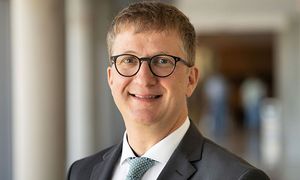A network for mental health
Clinical Networks
In patient care, we cooperate with many disciplines of the University Hospital Würzburg. In addition, we collaborate closely with numerous colleagues in private practice, which enables us to provide seamless care for our joint patients. The cooperations are supplemented by important regional facilities for accompanying care during or after inpatient treatment:
Alcoholics Anonymous (AA)
Regional support group.
Alzheimer Gesellschaft Würzburg
non-profit self-help organisation with information, services and events for patients and their families
Autism Competence Center Unterfranken
Self-help association for people with autism and their families. Providing advice, training and skills Training.
Bayerischer Landesverband Psychiatrie-Erfahrener
Bavaria-wide self-help organisation by and for people who have had experience with psychiatry or mental crises.
Blue Cross
Christian support group for people with addiction problems
Bündnis gegen Depression (Alliance against Depression)
Regional branch of the umbrella organisation providing information, events and further links.
Link to Bündnis gegen Depression (Alliance against Depression)
Caritas
Care and treatment of people with addiction problems by the Catholic Social Association.
Diakonie
Social institution of the Protestant Church with professional and volunteer help for people in ill health and crises.
Geriatric rehabilitation center of the Bürgerspital
Geriatric center with day clinic for more intensive treatment and care of elderly people with neurological or mental illnesses
Geriatric rehabilitation center of the AWO
Rehabilitation center for elderly patients to improve their physical, mental, emotional and social well-being.
Halma e.V.
The association " Hilfe für alte Menschen im Alltag (Help for elderly people in everyday life)" (HALMA) advises and supports dementia patients and their relatives in particular
Hochschulambulanz für Psychotherapie (University Outpatient Clinic for Psychotherapy)
Outpatient program for cognitive psychotherapy of the Faculty of Psychology at the University of Würzburg.
Link to Hochschulambulanz für Psychotherapie (University Outpatient Clinic for Psychotherapy)
Comprehensive Anxiety Center
The interdisciplinary center uses the expertise of psychiatrists and psychologists of the Center of Mental Health in cooperation with hospitals from Lower Franconia and other regions of Southern Germany to ensure optimal therapy for patients with anxiety disorders.
Kreuzbund Diözesanverband Würzburg e.V.
Self-help and helper community for people with addictions and their families.
Social-psychiatric service
A wide range of counselling and care options offered by the regional Erthal Sozialwerk to help people with mental illness in their everyday lives.
Verein "Der Regenbogen"
Friends and sponsors of the psychiatric day clinic of the Department of Psychiatry, Psychosomatics and Psychotherapy (PPP) of the University Hospital Würzburg.
Regional scientific networks
Within the University Hospital Würzburg and the University of Würzburg, we are members of the following centers or cooperate in fields of research with:
Comprehensive Heart Failure Center (CHFC)
Cooperating research institution on the topic of interactions between heart and mental diseases.
Center of Mental Health
Association of all treatment facilities and research institutes for psychiatric diseases of the University Hospital Würzburg and the University of Würzburg.
Center for Rare Diseases
The Reference Center Northern Bavaria (ZESE) supports and coordinates, among other things, the interdisciplinary activities in patient care, research and teaching in the field of the deletion syndrome 22q11.2.
Interdisciplinary Center for Addiction Research Würzburg
The interdisciplinary center of the University of Würzburg promotes and coordinates research, training, teaching, events and projects in the field of addiction Research.
Link to Interdisciplinary Center for Addiction Research Würzburg
National and international scientific networks
Both inside and outside Germany we are part of the following associations or research projects:
CRC TRR 58 „Fear, Anxiety and Anxiety Disorders“
In cooperation with the university hospitals of Münster, Hamburg and Mainz, we are currently participating in two studies on fear, anxiety and anxiety disorders as part of the multi-site Collaborative Research Center (CRC).
BMBF Protect-AD
The research association of seven highly specialised university institutions, funded by the Federal Ministry of Education and Research, aims to continuously improve cognitive behavioural therapy for anxiety disorders.
PGC
In the Psychiatric Genomics Consortium (PGC), more than 800 scientists from 36 countries are researching the role of genes in the development of anxiety disorders and other mental illnesses in over 400 Projects.
Enigma
The international working group is focusing on the development and optimization of various imaging techniques on metabolic processes and brain structures in anxiety disorders and other mental disorders.
FTLD Consortium
The consortium of twelve German and eleven Italian centers is investigating the early stage of the disease and the progression of the very rare frontotemporal lobar degeneration (FTLD), which is associated with changes in speech, personality and social behavior.
Better together
There are about 100,000 self-help groups with 3.5 million people active throughout Germany. There are also self-help groups in your home region offering support in coping with health and social problems.
As a self-help-friendly university hospital, we work very closely with self-help institutions and counseling centers.
The following contacts will help you to find the right self-help group in your region:
Aktivbüro der Stadt Würzburg
Phone: +49 931 37-3468
E-Mail: aktivbuero@stadt.wuerzburg.de
Self-help contact office of the Paritätischer Wohlfahrtsverband
Phone: +49 931 35401-17
E-Mail: selbsthilfe-ufr@paritaet-bayern.de
External self-help representative of the University Hospital Würzburg
Gabriele Nelkenstock
Phone: +49 931 88079447
E-Mail: selbsthilfe@ukw.de
Contact
Prof. Dr. med.
Sebastian Walther M.D.
Head of the Department of Psychiatry, Psychosomatics and Psychotherapy
+49 931 201-77000
Contact
Appointment
Policlinic
Phone: + 49 931 201-77800
E-Mail: ep_poli@ukw.de
In-patient care
Phone: +49 931 201-76050
E-Mail: ep_poli@ukw.de
Address
Klinik und Poliklinik für Psychiatrie, Psychosomatik und Psychotherapie des Universitätsklinikums | Margarete-Höppel-Platz 1 | 97080 Würzburg | Deutschland

